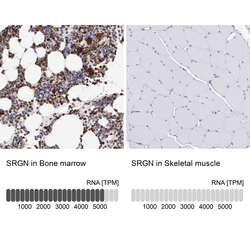Antibody data
- Antibody Data
- Antigen structure
- References [10]
- Comments [0]
- Validations
- Immunohistochemistry [1]
Submit
Validation data
Reference
Comment
Report error
- Product number
- HPA000759 - Provider product page

- Provider
- Atlas Antibodies
- Proper citation
- Atlas Antibodies Cat#HPA000759, RRID:AB_1079675
- Product name
- Anti-SRGN
- Antibody type
- Polyclonal
- Description
- Polyclonal Antibody against Human SRGN, Gene description: serglycin, Alternative Gene Names: PPG, PRG, PRG1, Validated applications: IHC, WB, Uniprot ID: P10124, Storage: Store at +4°C for short term storage. Long time storage is recommended at -20°C.
- Reactivity
- Human
- Host
- Rabbit
- Conjugate
- Unconjugated
- Isotype
- IgG
- Vial size
- 100 µl
- Concentration
- 0.1 mg/ml
- Storage
- Store at +4°C for short term storage. Long time storage is recommended at -20°C.
- Handling
- The antibody solution should be gently mixed before use.
Submitted references Serglycin secreted by late-stage nucleus pulposus cells is a biomarker of intervertebral disc degeneration
Significance of serglycin and its binding partners in autocrine promotion of metastasis in esophageal cancer
Molecular signature of extracellular matrix pathology in schizophrenia
Proteoglycan serglycin promotes non-small cell lung cancer cell migration through the interaction of its glycosaminoglycans with CD44
Serglycin as a potential biomarker for glioma: association of serglycin expression, extent of mast cell recruitment and glioblastoma progression.
Serglycin in tumor microenvironment promotes non-small cell lung cancer aggressiveness in a CD44-dependent manner
Serglycin in Quiescent and Proliferating Primary Endothelial Cells.
Serglycin Proteoglycan Is Required for Multiple Myeloma Cell Adhesion, in Vivo Growth, and Vascularization
Monocyte-to-Macrophage Differentiation
From Gene Expression Analysis to Tissue Microarrays
Chen F, Lei L, Chen S, Zhao Z, Huang Y, Jiang G, Guo X, Li Z, Zheng Z, Wang J
Nature Communications 2024;15(1)
Nature Communications 2024;15(1)
Significance of serglycin and its binding partners in autocrine promotion of metastasis in esophageal cancer
Zhu Y, Lam A, Shum D, Cui D, Zhang J, Yan D, Li B, Xu W, Lee N, Chan K, Law S, Tsao S, Cheung A
Theranostics 2021;11(6):2722-2741
Theranostics 2021;11(6):2722-2741
Molecular signature of extracellular matrix pathology in schizophrenia
Pantazopoulos H, Katsel P, Haroutunian V, Chelini G, Klengel T, Berretta S
European Journal of Neuroscience 2020;53(12):3960-3987
European Journal of Neuroscience 2020;53(12):3960-3987
Proteoglycan serglycin promotes non-small cell lung cancer cell migration through the interaction of its glycosaminoglycans with CD44
Guo J, Chiu C, Wang M, Li F, Chen J
Journal of Biomedical Science 2020;27(1)
Journal of Biomedical Science 2020;27(1)
Serglycin as a potential biomarker for glioma: association of serglycin expression, extent of mast cell recruitment and glioblastoma progression.
Roy A, Attarha S, Weishaupt H, Edqvist PH, Swartling FJ, Bergqvist M, Siebzehnrubl FA, Smits A, Pontén F, Tchougounova E
Oncotarget 2017 Apr 11;8(15):24815-24827
Oncotarget 2017 Apr 11;8(15):24815-24827
Serglycin in tumor microenvironment promotes non-small cell lung cancer aggressiveness in a CD44-dependent manner
Guo J, Hsu H, Tyan S, Li F, Shew J, Lee W, Chen J
Oncogene 2016;36(17):2457-2471
Oncogene 2016;36(17):2457-2471
Serglycin in Quiescent and Proliferating Primary Endothelial Cells.
Reine TM, Vuong TT, Rutkovskiy A, Meen AJ, Vaage J, Jenssen TG, Kolset SO
PloS one 2015;10(12):e0145584
PloS one 2015;10(12):e0145584
Serglycin Proteoglycan Is Required for Multiple Myeloma Cell Adhesion, in Vivo Growth, and Vascularization
Purushothaman A, Toole B
Journal of Biological Chemistry 2014;289(9):5499-5509
Journal of Biological Chemistry 2014;289(9):5499-5509
Monocyte-to-Macrophage Differentiation
Chang M, Chan C, Braun K, Green P, O'Brien K, Chait A, Day A, Wight T
Journal of Biological Chemistry 2012;287(17):14122-14135
Journal of Biological Chemistry 2012;287(17):14122-14135
From Gene Expression Analysis to Tissue Microarrays
Ek S, Andréasson U, Hober S, Kampf C, Pontén F, Uhlén M, Merz H, Borrebaeck C
Molecular & Cellular Proteomics 2006;5(6):1072-1081
Molecular & Cellular Proteomics 2006;5(6):1072-1081
No comments: Submit comment
Supportive validation
- Submitted by
- Atlas Antibodies (provider)
- Enhanced method
- Orthogonal validation
- Main image

- Experimental details
- Immunohistochemistry analysis in human bone marrow and skeletal muscle tissues using HPA000759 antibody. Corresponding SRGN RNA-seq data are presented for the same tissues.
- Sample type
- Human
- Protocol
- Protocol
 Explore
Explore Validate
Validate Learn
Learn Western blot
Western blot Immunohistochemistry
Immunohistochemistry